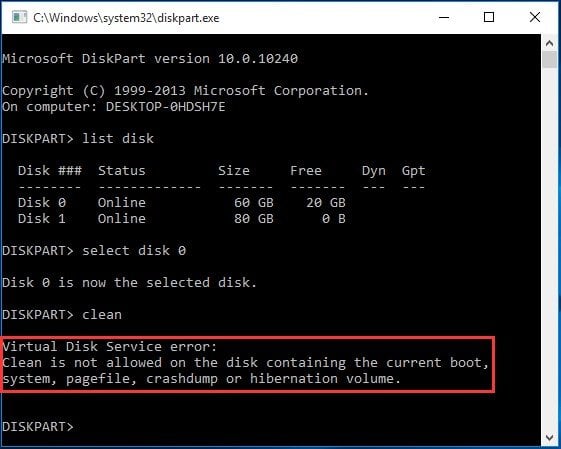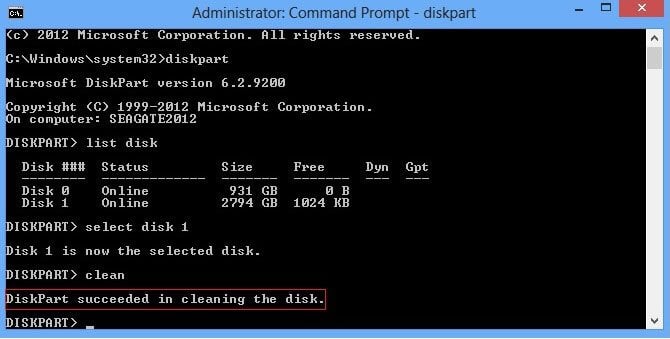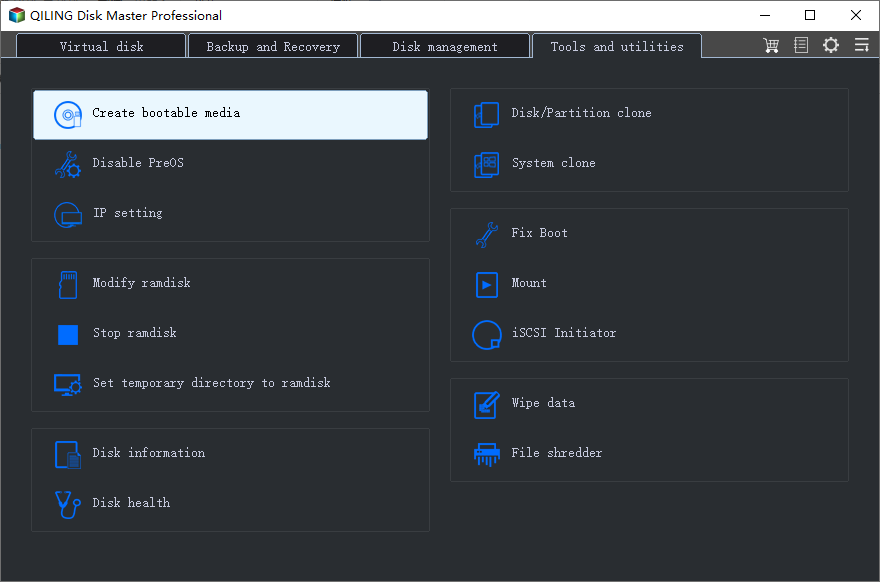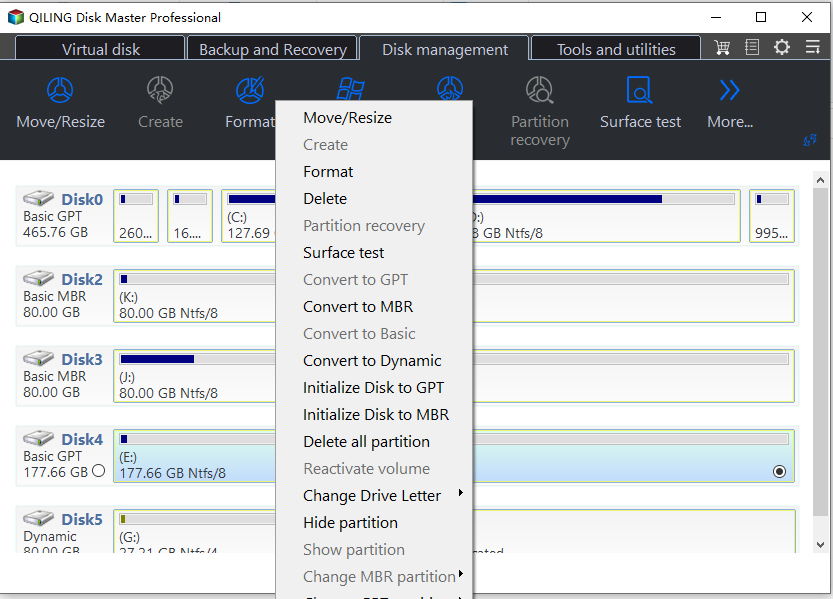Best 2 Ways to Fix "Virtual Disk Service Error Clean Is Not Allowed"
The problem: Virtual disk service error clean is not allowed
I have a Windows 8.1 Lenovo Yoga 13 with 128GB hard drive, and I bought an identical 128GB SSD from eBay, which comes with a Windows 8.1 installed and all the partitions. But I want to use it as my secondary storage device and delete everything on the new SSD. But I can't delete the partition on the new SSD via Disk Management. Then I used diskpart clean command to clean the new SSD drive, I get an error message: virtual disk service error: clean is not allowed on the disk containing the current boot, system, pagefile, crashdump or hibernation volume. I'm not using it as my system disk, why I can't clean it at all? Can anyone help? Thanks.
The cause: why clean is not allowed on the disk
Using the diskpart clean command on the system disk can result in an error message, as it contains critical Windows operating system files. If allowed, cleaning the system disk would delete all data and partitions, leading to numerous errors and chaos.
To resolve the issue of the virtual disk service error "clean is not allowed" when trying to clean the system disk after installing a new SSD drive, you can try the following: disable the virtual disk service, delete the virtual disk, and then clean the system disk using the built-in disk management tool. Alternatively, you can use a third-party disk cleaning software to clean the system disk without disabling the virtual disk service. However, it's essential to be cautious when using third-party software to avoid any potential data loss or system corruption. If you're unsure, it's recommended to seek the help of a professional or consult the manufacturer's documentation for specific guidance.
How to fix “diskpart virtual disk service error clean is not allowed” in Windows PC?
To solve the "clean is not allowed on the disk containing the current boot" problem, you can delete partitions on the system disk under a WinPE environment. This can be achieved through two methods, and you can choose the one that suits your needs.
Way 1. Using Windows installation disc to clean
If you have the Windows installation disc, you can follow these steps to resolve the "clean is not allowed on the disk" issue in Windows 7/8/10/11: Simply insert the installation disc, boot from it, and follow the on-screen instructions to select the Windows installation you want to repair. From there, you can choose to repair your Windows installation, which should resolve the "clean is not allowed on the disk" issue.
1. Insert the Windows installation disc, then boot from it.
2. Click Repair your computer> Troubleshoot >Advanced Options > Command Prompt.
3. Then input the diskpart commands to clean hard disk:
- diskpart
- list disk
- select disk [disknumber]
- clean
To resolve the issue of a corrupted Windows system, you could create a new partition on the drive to solve this problem. If the solution is not working for you, you could try the alternative method.
Way 2. Force clean the boot disk with a partition manager
If you don't have a Windows installation disc, you can use a third-party partition manager like Qiling Disk Master Professional to solve the "virtual disk service error clean is not allowed" problem. This software is highly recommended by Windows users due to its user-friendly interface and comprehensive functions. You can use it to create bootable media and then delete all partitions on the system disk to resolve the issue.
Before cleaning the system disk:
1. You can install Qiling Disk Master Pro, and a free demo version is also available for download and trial.
2. Prepare an empty USB flash drive at least 13GB.
3. If necessary, you can back up system in advance.
Step 1. Create Bootable Media
1. Insert the USB drive and ensure it can be detected. Launch the software, click "Tools" in the top toolbar, and select "Make Bootable Media".
2. Click Next.
3. Tick USB Boot Device to create bootable USB drive.
4. Press Proceed.
Step 2. Delete all partitions on system disk
After creating bootable media, boot your computer from the USB stick, and you will see Qiling Disk Master on the desktop. Run this program and delete all partitions on your system disk by following the steps provided.
1. To delete all partitions on the system disk, click on the system disk in the Disk Management window, right-click on it, and select "Delete all partitions" from the dropdown menu.
2. The system disk cannot be used for cleaning.
To resolve the virtual disk service error clean is not allowed issue, create a new partition on the hard drive as the secondary storage device. This should solve the problem.
Final Words
Qiling Disk Master is a partition management tool that can force delete system partitions or disks, solve FAT32 volume size issues, convert between MBR and GPT without deleting partitions, and resolve errors like formatting system partitions or deleting boot partitions.
If you are running Windows Server 2019, 2016, 2012, 2008 and 2003, please try Qiling Disk Master Server.
Related Articles
- Easily Fixed: Windows Has Detected File System Corruption on Disk C
Get “Windows has detected file system corruption on local disk (C:)” error on system restore? Find quick fixes to file system corruption on local disk C. - How to Boot Windows 10 from USB Flash Drive (2 Approaches)
Booting Windows 10 from USB flash drive can help you with clean installation or troubleshooting, especially when a PC crashes and fails to boot. Here's how to do it correctly. - Fix: Computer Won't Boot from CD or DVD in Windows 10 (4 Ways)
Computer won't boot from CD or DVD in Windows 10, 8 or 7? Don't worry. Just read this guide and learn how to fix it. - Two Methods to Create WinPE Bootable Disk in Windows 10 Effectively
This article provides two ways to create WinPE bootable disk for Windows 10. Take a look at and choose a proper method to make WinPE bootable drive.




